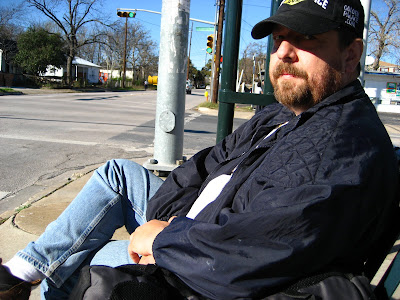
Redshirt60M snagged his leopard print shirt last night on a chain-link fence in the alley when the wind shifted and blew the cold wet gusts down on him between the buildings. He awoke to find, to his dismay, the damage he had caused in the night. He gathers his belongings and makes his way out of the alley. When he hits the street the sun hits his face and he realizes, like we all did that morning, that the sun was out in the middle of January and if felt good. This turned the man’s sprits. He would search out a nice spot to enjoy the sun and mend his garment. As he walks down the sidewalk in the direction of the library he decides that the tables there will suit his needs. He decides, weather consciously or sub-consciously is unknown, to sit on the sunny side where the sun is the most direct. He chooses to sit under a tree, which filters the light making it the perfect quality for close detail work while letting enough light through to keep him dexterous and comfortable. The table he chooses is the one nearest my camera setup. He loses himself in his work, randomly speaking to himself in hushed whispers.
Greyshirt65M wakes late in the day surprised to have the sun bearing down on his face. He spent his night shivering on the courthouse stairs and expecting a dreary Sunday. He wanders the streets of downtown peering into the various news stands until he notices the game he had heard about earlier that week. The game is on and he is intent on hearing it. He digs through his bindle and pulls out a cheap handheld radio, in which he installs mismatched AA batteries. The batteries work and the game is at hand, he now needs a place to relax. He makes his way to the park on 9th and Guadalupe only to find the grass wet from the previous day’s rain. He leaves the comfort of the grassy park and searches for a warm dry place where he can share the joy of his boisterous battery-powered treasure. He takes a seat in the second table away from my camera setup and relaxes. He sits and listens as he carries on with passers by. Most ignore him some reply with an unrehearsed line of assurance while others enjoy his company and join him at the table ( e.g. Bluehoody?M and Greenjacket60M). He has enjoyed his day feeling satisfaction with his social achievements and sense of acceptance which is inherent to outgoing and enthusiastic sports fans.
Brownhat45M stayed up late last night in his home, alone. He watched television with envy as the characters live out their ideal existence. He thinks back to when he was younger and would sit in the park and read alone and undisturbed while surrounded by people. Being around people would always make him feel good, yet he never mastered the simple social graces of the average citizen. He went to bed with a plan to find a good reading spot, one that would be public but quiet, sunny but not in the sun, and near an unlimited supply of reading material. He awoke with the perfect location. He makes his way to the bus from his East Austin flat and within the hour he is on the south side of the library, book in hand. He sits at the third table from my camera setup and reads contently until his nicotine to blood level diminishes. He lights his cigarette and begins to observe those around him. His eyes shift from here to there in suspicious jerks as his discomfort becomes more obvious. He shifts in his chair and hotboxes the remainder of his loose before going back to his book, but it is all different now. He is uncomfortable now and feels that he is being watched. He reads in increasingly shorter intervals until he abandons his book in lue of staring at the ground. After a long stint of what appears to be self-council, the man lifts up his book and begins reading again. He has rediscovered contentment for the moment.






























